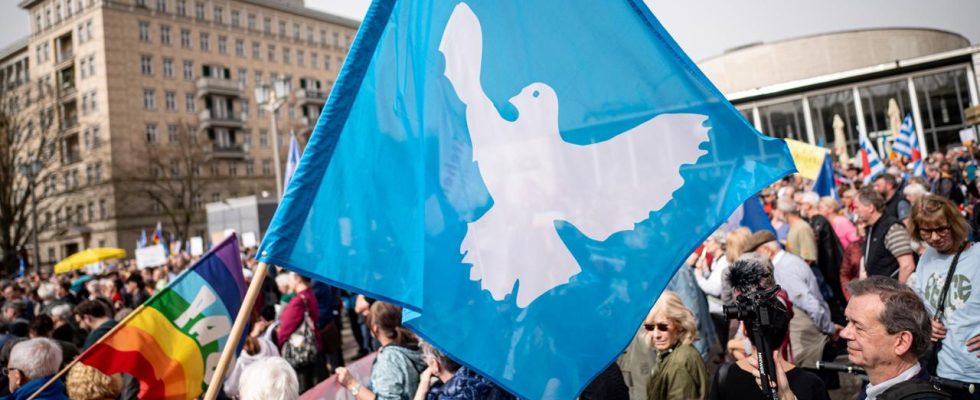In many cities, people took to the streets for Easter marches. The focus was on the wars in the Gaza Strip and Ukraine. Demonstrators called for a ceasefire, negotiations and a stop to arms deliveries.
This year again, people gathered for Easter marches in numerous German cities on Holy Saturday. Around 70 events were announced across the country. Saturday was considered the main day of action for the traditional peace demonstrations, which also continue on Easter Sunday and Easter Monday.
This year the focus is on the Russian war of aggression against Ukraine and the war in the Middle East. A central theme of the marches is the demand for a ceasefire, diplomatic solutions and an end to arms deliveries. The demonstrators are also calling for nuclear disarmament and criticizing increasing arms spending.
The events were accompanied by urgent warnings from top representatives of the federal government and the opposition to continue to support Ukraine militarily in its defensive struggle – also with a view to German security interests.
Police: 3,500 participants in Berlin
In Berlin, the police counted around 3,500 participants on Saturday, and 6,000 demonstrators had previously been registered with the police. Peace negotiations in Ukraine and the Gaza Strip, disarmament and an end to the debate about the reintroduction of compulsory military service were called for. The call for demonstrations was supported by numerous groups and associations. The organizers had previously differentiated themselves from the right.
The motto of the Easter march was “Fit for war – never again”. According to the dpa news agency, several participants in the demonstration showed signs with inscriptions such as “Friendship with Russia – Viva Palestine” and “Peace with Russia” on Karl-Marx-Allee in Friedrichshain. Others turned against the federal government. In addition to the dove of peace, Palestinian flags and Russian flags could also be seen.
At a counter-demonstration, announced as an alternative Easter march, the Ukraine Alliance Vitsche called for support for Ukraine and solidarity with the victims of the Russian war of aggression. The motto of the just over 100 participants was “Now more than ever – peace must be defended”.
Rallies in numerous cities
According to a preliminary overview by the Peace Cooperative Network, more than 10,000 people took to the streets nationwide. In Stuttgart there were around 2,000 people and in Bremen around 1,000 people. Around 700 people took part in Cologne and 500 in Munich. According to the police, at least 800 participants demonstrated in Wiesbaden under the motto “Peace in the Middle East”.
According to the police, around 630 people came together in Hanover. According to the police, around 150 demonstrators gathered in front of the grounds of the arms company Rheinmetall in Unterlüß in Lower Saxony. Several hundred people also came to the marches in Duisburg, Saarbrücken, Leipzig and Kassel. The spokesman for the peace cooperative, Kristian Golla, was satisfied with the number of participants. The number is about the same as last year, he said.
At the meeting in Cologne, left-wing Bundestag member Kathrin Vogler warned against a “militarization of society.” They were shocked by Russia’s attack on Ukraine, but it was a misconception on the part of the federal government and the Union to believe that “further wars in Europe could be prevented primarily by arming themselves to the maximum.” In the current situation, a policy that “prepares for peace” is needed.
The theologian Margot Käßmann reiterated her call for a diplomatic initiative to end the war in Ukraine. The peace movement is about putting an end to the killing, said the former council chairwoman of the Evangelical Church in Germany on Inforadio RBB. Soldiers and civilians would die in this war every day. We shouldn’t just talk about weapons and weapon systems all the time, but rather it should be about how this war can be ended: “Just more weapons” won’t bring peace.
Scholz: “Without justice, no peace”
In a video message at Easter, Chancellor Olaf Scholz reiterated his willingness to support Ukraine. “We all long for a more peaceful world,” he said. But there is no peace without justice, “Peace without freedom means oppression.” That is why Germany supports Ukraine “resolutely and prudently” in its fight for a just peace.
This is also in Germany’s interest. Peace in Europe is based on the principle that borders should not be moved by force. The SPD politician called for German unity and explained: “Especially since we are united by the conviction that the law must prevail against violence.”
Foreign Minister Annalena Baerbock warned against one-sidedness with regard to the Easter marches. The peace rallies should send the message that humanity is indivisible, “everything else is extremely dangerous,” she told the newspapers of the Funke media group. “People in Israel must not be played off against people in Palestine. And we must not pit our desire for peace against peace in Ukraine.” Ukraine’s security is “ours too,” said the Green politician.
The Russian army invaded Ukraine in February 2022. Since then, Ukraine has been defending itself against attacks from its neighboring country. The war in the Gaza Strip is a consequence of the terrorist attack on Israel by the militant Islamist Hamas and other extremist organizations on October 7, 2023. According to Israeli information, the terrorists killed almost 1,200 people and kidnapped around 250 others as hostages in the Gaza Strip. Since then, Israel has been fighting Hamas in the coastal strip, but this has also resulted in numerous civilian casualties. According to Hamas-controlled authorities, more than 30,000 people were killed. The numbers cannot be independently verified.

